#seth dickinson
Text
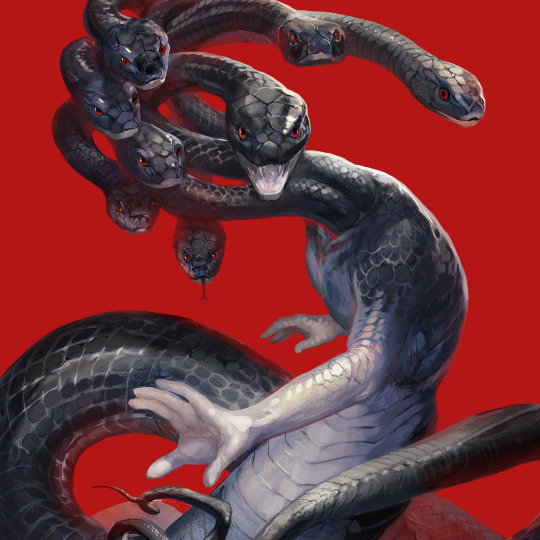
Devilman Crybaby meets Marvel’s Venom in Exordia, the science fiction debut of Seth Dickinson, author of The Traitor Baru Cormorant.
Ssrin Character Illustration by Julie Dillon
WHAT’S IT ABOUT
Meet Anna Sinjari, a refugee and disaffected office worker eking an existence in New York City. Her life is about to be upended by Ssrin, an alien with eight serpent heads, no qualms with cold-blooded murder, and an appetite for turtles (yum).
The universe is governed by seven passions, seven patterns which appear again and again, across species and across time. Anna and Ssrin are bound by the last and the greatest. The cosmos itself ships their very souls. Specifically for them, that means they’ll have to outmaneuver spies, armies, and government agencies to save humanity from a diabolical alien entity, hellbent on pinioning the souls of every creature on earth.
Exordia is expansive adventure science fiction that reads like a race-against-the-clock thriller in the vein of Michael Crichton, but steeped in the irony, humor, and pain of the Internet age. An alien-human epic for those who've always rooted for the monster.
#ssrin#seth dickinson#exordia#baru cormorant#traitor baru cormorant#julie dillon#original artwork#booklr#new books#monster lit#action#adventure#science fiction
2K notes
·
View notes
Text
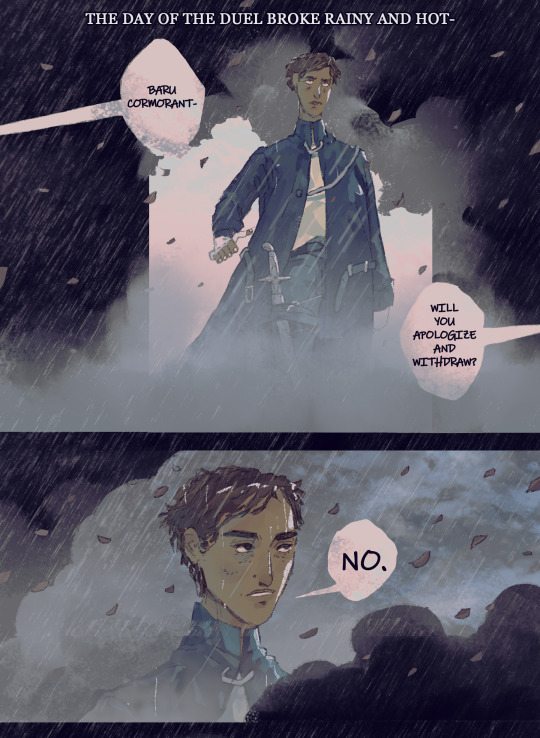
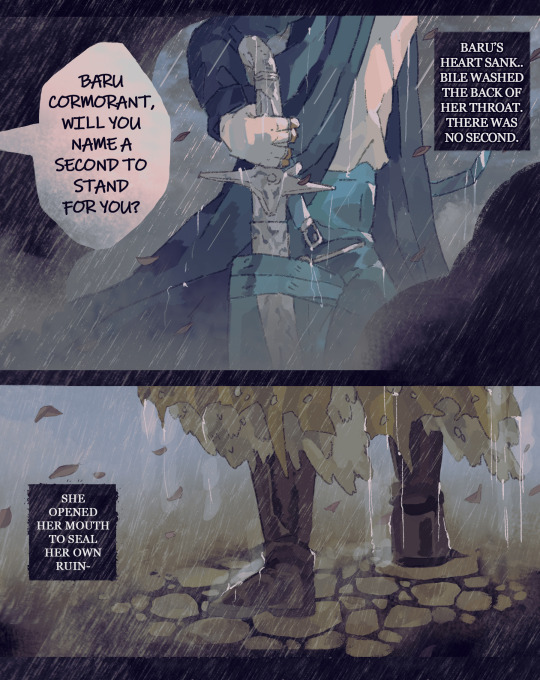

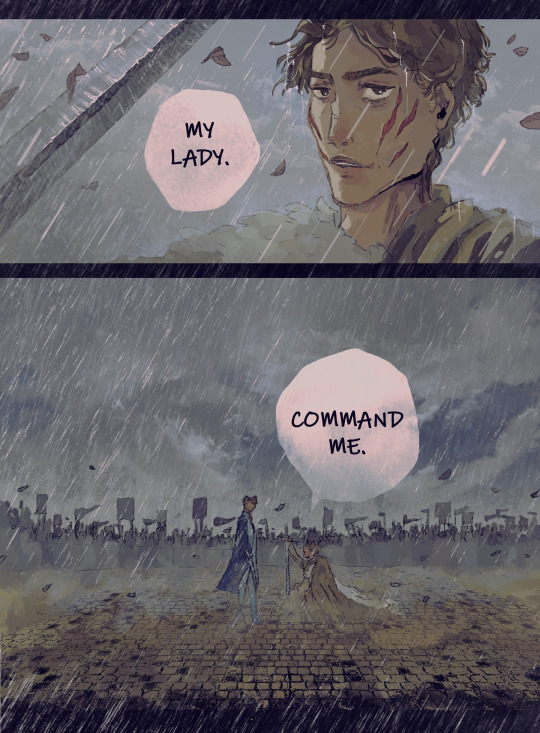
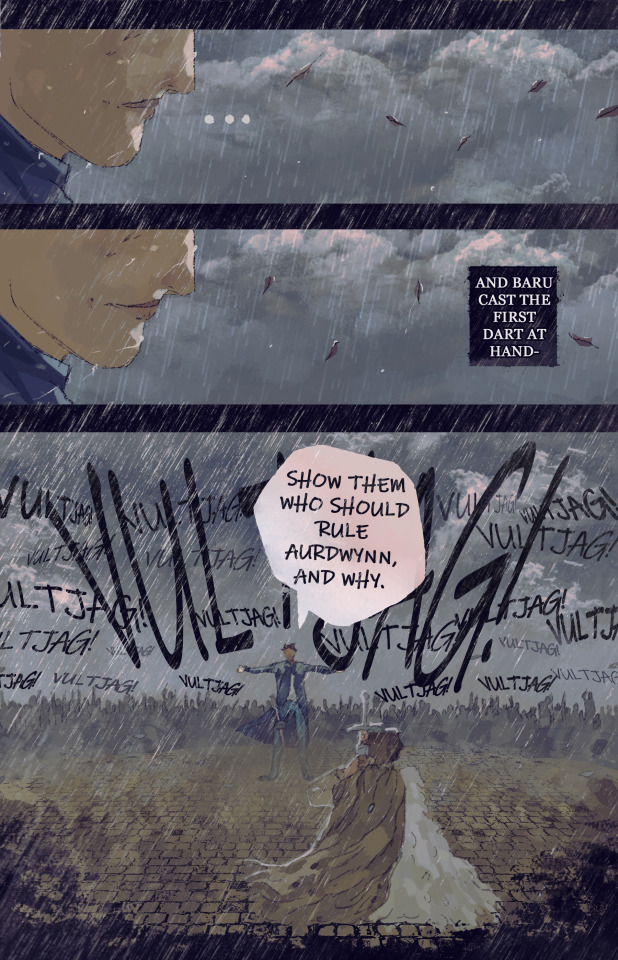
And Baru cast the first dart at hand, the words that set the coopers and the fishmongers and the bannermen of Lyxaxu and Oathsfire and Unuxekome roaring: “Show them who should rule Aurdwynn, and why.”
Vultjag! the poorer parts of the crowd screamed, a raw astonished sound. Vultjag!
#this was tain hu's wet shirt darcy scene i fear#i was rereading this book I FORGOT HOW FUCKING GOOD IT IS AND THIS FUCKIGN SCENE DKHGDFG#TAIN HU DUCHESS VULTJAG THE WOMAN THAT YOU ARE#the traitor baru cormorant#baru cormorant#tain hu#the masquerade#seth dickinson#my art#fanart#the traitor baru spoilers
850 notes
·
View notes
Text
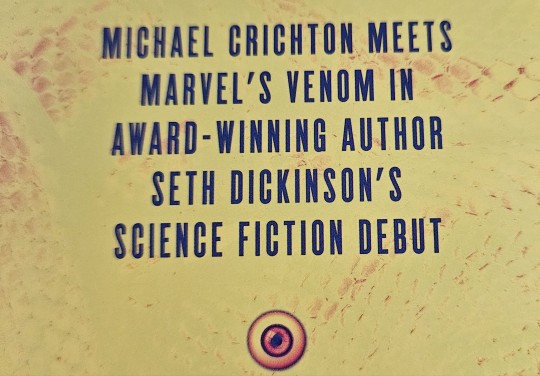
I'm going to be real with you Tordotcom publishing if I wasn't already committed to reading this then this marketing copy on the jacket might have made me put it down
395 notes
·
View notes
Text
We are not a government. We are not the eyes, or the ears, or the mind of the Republic. We are parasites. And if we ever cease to benefit that host, the Republic will expunge us. Understand this, my inheritor! If Aurdwynn’s first habit is rebellion, then Falcrest’s first love is revolution. Falcrest, oh Falcrest, she will lobotomize her rulers and rise up crying out from the Suettaring hilltops:
We demand a better form of tyranny!
It will be up to you to devise that better form.
For the more we feed our host Republic, the hungrier it seems to grow.
In our grand successes over the past century we have invented a monster called a middle class. Our predecessors pillaged the Ashen Sea, and now the people are accustomed to receiving that pillage. And they are accustomed to their innocence. If they learn what we do on distant shores to secure their safety and prosperity, I am certain they would hang us all. Not for the crime of what we did, mind! But for the crime of allowing them to know.
Seth Dickinson, The Monster Baru Cormorant
385 notes
·
View notes
Text
Exordia - advance review
So. I finished the book!
This is not everything I will write about Exordia. That will come when the book is like, officially out, and I feel comfy spelling out the ending and quoting passages at length.
This 'advance review' is split into two parts. The first part is quite abstract, so I'll copy it here.
If Baru took an elliptical path towards its subject matter, by defamiliarising and rearranging the material of history… Exordia just gets straight in there.
How to describe Exordia? Maybe you could call it philosophy-driven science fiction, a thought experiment about ethics. Maybe you could compare it to Arrival, but shot up with black humour (it’s a book that could make me laugh and cry, sometimes at the same time) and real tragedy (at the core is the genocide of the Kurds in the late 80s, and the many betrayals and failures of American imperialism). It’s got a lot of action and military details, with a good few spies and soldiers as central characters, but broadly it’s one of the sharpest eviscerations of the US military and its role in the world I’ve encountered in Western science fiction.
The first two thirds or so lay out the driving, fascinating ‘what the hell is this thing’ mystery lined with all manner of juicy body horror and drama—yet the core high-concept premise is laid out almost immediately, you know what's at stake. The last third… escalates.
It’s full of the usual meaty Seth themes, iterating on the ideas first laid out in Baru. But it’s a distinct flavour of its own. That escalation is… well, I can’t describe in detail, not while the book isn’t even out, but it’s nuts. Not just for the scale, but for how convincingly it sells concepts that if I described them straightforwardly would sound completely ridiculous.
Equally, it’s a study of a markedly diverse group of characters thrown together from all over the world, each constructed with very evident care and nuance. It goes places that so many writers would probably feel ‘damn, that’s probably way too thorny for someone like me to write about’—and yet somehow, it manages to handle it gracefully each time. Certainly, you can perhaps inevitably tell when Seth is writing from direct experience and when they are (as they used to say back in the ’10s) Writing The Other, if only through what they assume you know and what they need to explain as much as everything—and yet there are always all these telling details (the scientist cursing out R) that make these characters come alive with convincing presence and humour.
(Of course the autistic-ass lesbians are my faves. It’s not as overtly a Lesbian Book as Baru was, but there’s a strong current of gay shit.)
A few other reviewers mention Crichton, but I haven’t read Crichton, so… I’ll have to make other comparisons. But then the thing is it’s very self-aware about existing in the fabric of science fiction. This book is set in our world, not in the near future but the recent past, in the late Obama administration. A lot of the things you might compare it to (including a couple I’ve mentioned, Arrival, Crichton) will be invoked as explicit, in-character allusions as these very sharp, funny, modern people try to make sense of their crazy situation. Sometimes it feels like Tamsyn’s use of memes as texture, but it never gets overbearing. The rhythms of Seth’s prose have been refined by Baru into a powerful suite of devices to make you cackle and go, noooo, Seetttthhhhh…
It’s a fascinating blend of hard-ish scifi, with the big ideas carried by surprisingly accurate higher-mathematical technobabble, and what you could probably best call occultism: narrative and ethics and gods and mythology. Seth always tends to deflect when praised for their ability to hop between a dozen different disciplines and pull them together into one unifying story, saying that they’re just good at looking up summaries, or that they had help from the right people. Maybe so, but it works, it passes the smell test, and Seth’s real genius is their remarkable ability to tie all these big grand ideas back into the world of character and emotion.
Since this is an advance review… I gotta be careful how much I say! Usually I assume you’ve read it if you’re going to and dive straight into the spoilers and long quotes, but here I feel like I should take a little care to avoid describing too precisely the exact beats of the story. (Rest assured I will give it the thorough treatment when it comes out in full).
But, I feel like I want to say something a little more substantial. So here’s a description of the mechanism. If all you want to know is whether you should read this book, hopefully I’ve given you plenty of reasons that the answer is god, yes, do it. If you want to know more, read on.
151 notes
·
View notes
Text
hey for all the locked tomb fans who are eating molten lava waiting for Alecto the Ninth to come out. you guys should all read The Traitor Baru Cormorant by Seth Dickinson.
#if you guys want an essay on why i will absolutely write one#but long story short if you like the locked tomb you’ll also like the traitor baru cormorant#if you like tlt you’ll like the traitor baru cormorant and if you like ttbc you’ll also like the poppy war#it’s like a pipeline. but it can also go both ways#vin speaks#the locked tomb#the traitor baru cormorant#the masquerade series#seth dickinson#tamsyn muir#tlt#alecto the ninth
92 notes
·
View notes
Text
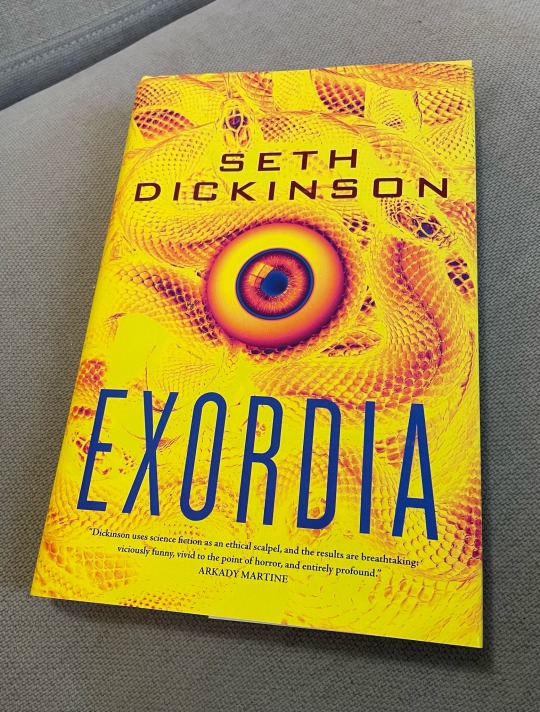

Incredible book. There’s no way to describe Exordia fully in a sentence, so, it’s about Obama-era foreign policy and the 1980’s Anfal Kurdish genocide and storytelling and first contact à la Roadside Picnic à la E.T. The Extra-Terrestrial, by the author of The Traitor Baru Cormorant. Science Fiction Fantasy Horror Queer Mystery, I guess??
(Also, you should read The Traitor Baru Cormorant)
96 notes
·
View notes
Text

Seth Dickinson
The Monster Baru Cormorant
#typographyedit#typoedit#litedit#typography#the monster baru cormorant#seth dickinson#baru cormorant#id in alt text#**t#**#THIS EXCERPT IS ABOUT DUCHESS VULTJAG TAIN HU LOVE OF MY LIFE!!!!!!!!!!!!!!!!!!!!!!!!!!!!!!
205 notes
·
View notes
Text
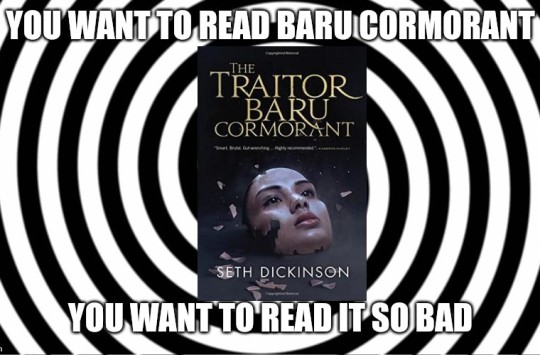
561 notes
·
View notes
Text

vote YES if you have finished the entire book.
vote NO if you have not finished the entire book.
(faq · submit a book)
61 notes
·
View notes
Text

Devilman Crybaby meets Marvel’s Venom in Exordia, the science fiction debut of Seth Dickinson, author of The Traitor Baru Cormorant.
WHAT’S IT ABOUT
Meet Anna Sinjari, a refugee and disaffected office worker eking an existence in New York City. Her life is about to be upended by Ssrin, an alien with eight serpent heads, no qualms with cold-blooded murder, and an appetite for turtles (yum).
The universe is governed by seven passions, seven patterns which appear again and again, across species and across time. Anna and Ssrin are bound by the last and the greatest. The cosmos itself ships their very souls. Specifically for them, that means they’ll have to outmaneuver spies, armies, and government agencies to save humanity from a diabolical alien entity, hellbent on pinioning the souls of every creature on earth.
Exordia is expansive adventure science fiction that reads like a race-against-the-clock thriller in the vein of Michael Crichton, but steeped in the irony, humor, and pain of the Internet age. An alien-human epic for those who've always rooted for the monster.
#exordia#seth dickinson#baru cormorant#traitor baru cormorant#monster lit#booklr#new books#action#adventure#science fiction
221 notes
·
View notes
Text
Having read the Masquerade series multiple times, I thought I knew roughly what to expect from Exorida.
But Exordia does not read like Baru Cormorant.
Exordia reads like Douglas Adams and Scott Alexander had a teleporter mishap The Fly style, and then the resulting chimera was given a low dose of acid, locked in a padded cell with only a laptop, and told to write a scifi novel before they could come out.
Whether this is a good thing or not, I could not say.
64 notes
·
View notes
Text
2024 Book Review #6 – Exordia by Seth Dickinson
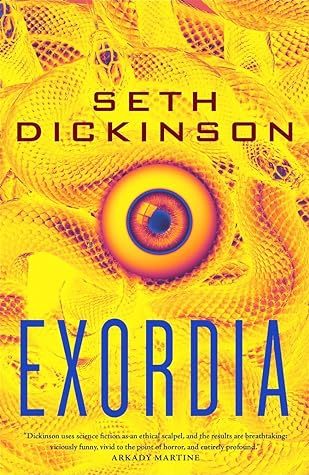
This is a book I have been looking forward to for quite literally years, from someone who is easily one of my favourite working authors. I also read the short story the book was expanded out from before I even knew it was going to be a book, and so went in spoiled on the broad strokes of what turned out to be the climax of the whole thing. All to say my opinion on this is unlikely to match that of the typical reader, I guess.
Anyway, Exordia is a glorious spectacular mess that has no right to cohere anywhere near as well as it does. It’s target audience is small, but I’m certainly somewhere in it. Please ignore all the marketing it’s so bad you have to wonder if someone at Tor just has it out for the author.
Exordia is a, well, a profoundly difficult book to give any sort of plot summary for. The first act involves Anna, a 30-something survivor of the Anfal Genocide now living a rather unimpressive life in New York City, until one day in the early 2010s she sees an alien eating the turtles in Central Park. Then there’s a cat-and-mouse hunt between terrifying alien snake-centaurs for the future of free will in the galaxy, and the plot jumping to kurdistan, and six more POV characters from as many different nations, and nuclear weapons, and oh so many people dying messily. The first act is an oddly domestic and endearing piece of table setting, the second is (to borrow the idiom of the book’s own marketing) Tom Clancy meets Jeff Vandermeer or Roadside Picnic, and the third is basically impossible to describe without a multipage synopsis, but mostly concerned with ethical dilemmas and moral injuries. It’s to the book’s credit that it never bats an eye at shifting focus and scale, but it does make coming to grips with it difficult.
This is, as they say, a thematically dense book, but it’s especially interested in the fallout of imperialism. The Obama-era ‘don’t do stupid shit’ precise and sterile form of it in particular – the book’s a period piece for a reason, after all. The ethics of complicity – of being offered the choice of murdering and betraying those around you or having an alien power with vastly superior destructive powers inflict an order of magnitude more misery to you, them, and everyone in the same general vicinity to punish you for the inconvenience – is one that gets a lot of wordcount. It is not an accident that the man most willing and able to collaborate with the overwhelming powerful alien empire in hopes of bargaining some future for humanity is the National Security Council ghoul who came out of organizing surveillance information for the drone wars. It’s also not a coincidence that the main (if only by a hair) protagonist is someone with a lot of bitter memories over how the US encouraged Iraq’s kurdish population to rebel in the ‘90s and then just washed their hands and let them be massacred (the book couldn’t actually ship with a historical primer on modern kurdish history, so it’s woven into the story in chunks with varying amount of grace. But it is in fact pretty thematically key here).
Speaking of complicity, the book’s other overriding preoccupation in (in the broadest sense) Trolley Problems. Is it better to directly kill a small number of people or, through your inaction, allow a larger number to die? Does it matter is the small number is your countrymen and the larger foreigners, or vice versa? What about humans and aliens? Does it matter whether the choice is submitting to subjugation or killing innocents as a means to resist it? What about letting people around you die to learn the fundamental truth of the cosmos? Does the calculus change when you learn that immortal souls (and hell) are real? This is the bone the story is really built around chewing on.
All that probably makes the text seem incredibly didactic, or at least like a philosophical dialogue disguised as a novel. Which really isn’t the case! The book definitely has opinions, but none of the characters are clear author-avatars, and all perspectives are given enough time and weight to come across as seriously considered and not just as cardboard cutouts to jeer at. Okay, with the exception of one of the two aliens who you get the very strong sense is hamming it up as a cartoon villain just for the of it (he spends much of the book speaking entirely in all caps). There definitely are a couple points where it feels like the books turning and lecturing directly at the reader, but they’re both few and fairly short.
The characters themselves are interesting. They’re all very flawed, but more than that they’re all very...embodied, I guess? Distracted with how hot someone is, concerned with what they ate that morning or the smell of something disgusting, still not over an ex from years ago. Several of them are also sincerely religious in a way that’s very true to life to actual people but you rarely see in books. The result is that basically comes as being far more like actual humans than I’m at all used to in most fiction (of course, a lot of those very human qualities get annoying or eye-roll inducing fairly quickly. But hey, that’s life). Though that’s all mostly the case at the start of the book – the fact that the main cast are slowly turning into caricatures of themselves as they’re exposed to the alien soul manipulation technology is actually a major plot point, which I’m like fifty/fifty on being commentary on what happens to the image and legacy of people as they’re caught up in grand narratives versus just being extended setup for a joke about male leads in technothrillers being fanfic shipbait.
Part of the characters seeming very human is that some (though by no means all) of the POVs are just incredibly funny, in that objectively fucked up and tasteless way that people get when coping with overwhelming shock or trauma. It’s specifically because the jokes are so in-your-face awful that they fit, I think? It manages to avoid the usual bathetic trap a lot of works mixing in humour with drama fall into, anyway.
Speaking of alien soul manipulation technology – okay, you know how above I said that the points where the book directly lectured the reader were few and far between. This is true for lectures about politics or morality. All the freed up space in this 530 page tome is instead used for technobabble about theoretical math. Also cellular biology, cryptography, entropics, the organization of the American security state, how black holes work, and a few dozen other things. This book was edited for accuracy by either a doctoral student from every physical science and an award winning mathematician, or else just by one spectacularly confident bullshitter with several hundred hours on wikipedia. Probably both, really. I did very much enjoy this book, but that is absolutely predicated on the fact that when I knew when to let my eyes glaze over and start skimming past the proper nouns.
The book has a fairly complete narrative arc in its own right, but the ending also screams out for a sequel, and quite a lot of the weight and meaning of the book’s climax does depend on followthrough and resolution in some future sequel. Problematically, the end of the book also includes a massive increase in scale, and any sequel would require a whole new setting and most of a new cast of characters, so I’m mildly worried how long it will be before we get it (if ever).
The book is also just very...I’m not sure flabby is the right word, but it is doing many many different things, and I found some of them far more interesting than others. I’m not sure whether Dickinson just isn’t great at extended action scenes or if I am just universally bored by drawn out Tom Clancy fantasies, but either way there were several dozen pages too many of them. The extended cultural digressions about the upbringing and backstories of each of the seven POVs were meanwhile very interesting! (Mostly, I got bored of the whole Erik-Clayton-Rosamaria love triangle Madonna complex thing about a tenth of the way into the book but it just kept going.) It did however leave the book very full of extended tangents and digressions, even beyond what the technobabble did. Anna herself, ostensibly the main protagonist, is both utterly thematically loadbearing but very often feels entirely vestigial to the actual, like, plot, brought along for the ride because she’s an alien terrorist’s favourite of our whole species of incest-monkeys. The end result is, if not necessarily unfocused, then at least incredibly messy, flitting back and forth across a dozen topics that on occasion mostly just seem unified by having caught the author’s interest as they wrote.
It’s interesting to compare the book to Anna Saves It All, the short story it was based on – quite a lot changed! But that’s beyond the scope of this already overlong review. So I guess I’ll just say make sure to read the book first, if you’re going to.
92 notes
·
View notes
Text
What a fucking weird person. Chaya wants to disassemble her and catalog all her pieces and put her back together just to know what the fuck is going on inside her. But she knows that if she did she would end up with one bit left over, an indecipherable "huh?" of unclear function.
— Exordia by Seth Dickinson, chapter 38
51 notes
·
View notes
Text
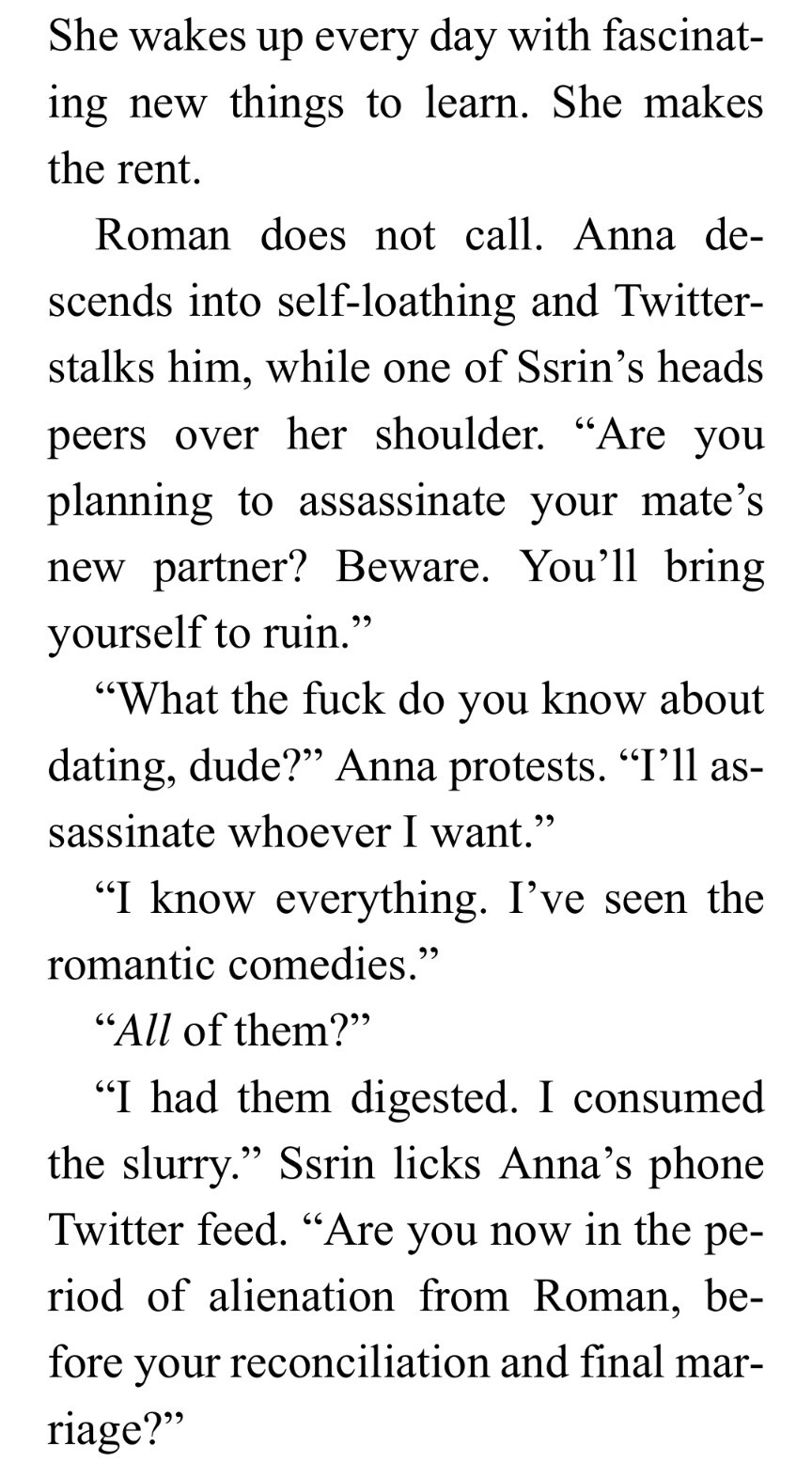


In a perfect world Ssrin would have a tumblr
53 notes
·
View notes
